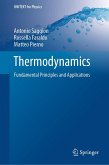Interfacial phenomena play a crucial role in various industrial processes and daily operations. These phenomena are related to the formation of emulsions and foams, adsorption on solid and fluid interfaces, wettability alteration, and others that strongly impact the quality and cost of products and processes. Understanding the interfacial phenomena encompasses inexorably the description of surface thermodynamics and the assessment of thermodynamic properties. The book Fundamentals of Surface Thermodynamics introduces the basics of the thermodynamics of interface from a perspective of chemical engineering thermodynamics and surface chemistry. It provides insights into real-life phenomena, emphasizing the practical significance of abstract properties routinely dealt with by scientists and engineers. The book is tailored for both graduate and undergraduate courses in chemistry and engineering schools. The book content is particularly beneficial for industry professionals involved in oil & gas, fluid transportation, nanotechnology, and other operations with multiphase complex systems, where the process effectiveness is affected by interfacial phenomena.
The Fundamentals of Surface Thermodynamics brings a comprehensive description of colloidal science, ranging from conventional surfactant applications to responsive systems and nanomaterials applied to life science. The author invites the reader on a journey into the fascinating world where small-dimension entities breathe. The book aims to inspire students and professionals to delve deep into the intricacies of interface thermodynamics, thereby contributing to supporting education activities and enabling industrial solutions.
The Fundamentals of Surface Thermodynamics brings a comprehensive description of colloidal science, ranging from conventional surfactant applications to responsive systems and nanomaterials applied to life science. The author invites the reader on a journey into the fascinating world where small-dimension entities breathe. The book aims to inspire students and professionals to delve deep into the intricacies of interface thermodynamics, thereby contributing to supporting education activities and enabling industrial solutions.
Dieser Download kann aus rechtlichen Gründen nur mit Rechnungsadresse in A, B, BG, CY, CZ, D, DK, EW, E, FIN, F, GR, HR, H, IRL, I, LT, L, LR, M, NL, PL, P, R, S, SLO, SK ausgeliefert werden.









